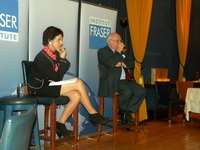The recent debate on the merits of Canadian multiculturalism between secular firebrand Djemila Benhabib and Montreal civil rights lawyer Julius Grey began to get personal after Benhabib accused the Canadian government of moral and intellectual cowardice. Hosted by the Fraser Institute at Peel Street’s Café Ferreira, an erudite crowd full of assorted academics and civil servants were especially eager to hear what Benhabib had to say about the province’s ongoing multiculturalism debate. Even as she read off a prepared text, Benhabib continued to insist responsible governments (especially those in the west) must continue to stick to their secular guns.
“Multiculturalism is a failure, “she said as she rejected any possibility for any kind of cultural or theocratic compromise. “It is leading to intolerable social contradictions which cannot be accepted in a free and democratic society.”
 Citing her own experience as a young woman in Algeria who was condemned to death before she managed to escape to Canada, she made her point about how secular societies are the only ones who can offer women their rights, justice and real freedom. While much of her scorn is reserved for traditional Islam and its brutal offhand treatment of women, she said she is willing to fight till her last breath for “the beauty, the passion and the intelligence” she finds among women in a free and democratic society.
Citing her own experience as a young woman in Algeria who was condemned to death before she managed to escape to Canada, she made her point about how secular societies are the only ones who can offer women their rights, justice and real freedom. While much of her scorn is reserved for traditional Islam and its brutal offhand treatment of women, she said she is willing to fight till her last breath for “the beauty, the passion and the intelligence” she finds among women in a free and democratic society.
“My fight is not so much a feminist’s fight for women as much as it is a woman’s fight for freedom,” she said.
As ever known for his ongoing battles for civil liberties, Julius Grey rejected Benhabib’s blanket rejection of multicultural accommodations because he believes an individual’s adhesion to a culture or a religion is nothing less than his or her choice guaranteed under Canada’s charter.
“Can we accommodate individual expressions such as a headscarf, a kirpan or a turban….Yes, “said Grey. “Can we accommodate collective expressions of cultural or religious associations such as schools or hospitals…No.”
Unfortunately, Grey was also forced to admit most of Québec’s collective institutions were not only tolerated but some actually received the highest level of subsidies offered to private and parochial schools in the entire nation. Based upon such arguments, Benhabib continued to denounce the government’s flaccid moral and intellectual position after which voices were raised as tempers began to fray at the seams. Following Grey’s arguments about religious symbols being a question of personal choice, Benhabib quickly pulled the audience to her side as her personal experience as a Muslim woman in a theocratic state continued to trump Grey’s convictions about civil rights and an individual’s ability to choose.
“Every Muslim woman knows even a headscarf isn’t only a matter of choice,” said Benhabib. “It’s an iconic symbol and it represents the implicit rejection of a secular society where women are free and allowed to make their own choices.”

























Commentaires
Veuillez vous connecter pour poster des commentaires.